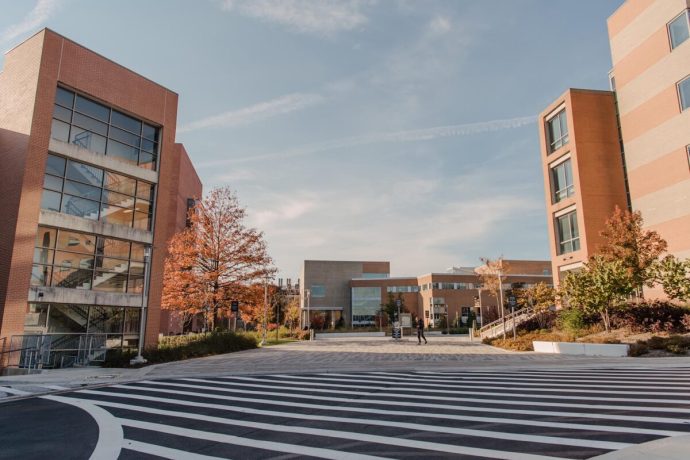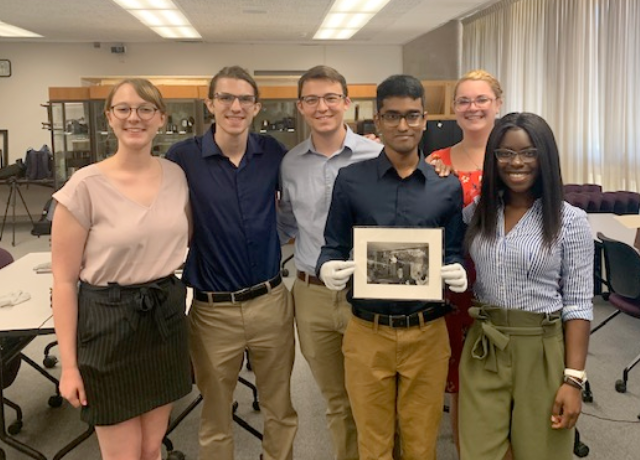- Carefully scaffold new experiences and ways of working for both students and faculty members. Start with the desired outcomes and design backwards from there.
- Build in regular opportunities for students to reflect on their learning.
- Model good collaboration for your students. Be aware that they are watching how faculty and staff colleagues interact with each other.
- Group work in which every student is bringing something unique to the table feels more authentic and productive than group work in which everyone has the same set of skills. Build opportunities for true interdisciplinary collaboration across quantitative and qualitative and/or humanistic disciplines.
- “Substantive” does not need to mean “long.” Shorter, intensive experiences can have a significant impact on students’ educations.
University of Maryland, Baltimore County’s Interdisciplinary CoLab
This program was featured in the Winter 2024 issue of the Building Blocks for a New Academy newsletter.

Since 2018, the Interdisciplinary CoLab at ACLS Associate Member University of Maryland, Baltimore County (UMBC) has offered undergraduates an intensive, four-week summer program in which they undertake a team-based narrative research project led by a faculty or staff member. Each project serves the needs of a community partner or sponsor and brings together an interdisciplinary team of students from across the university. Projects result in public-facing products that often amplify marginalized community voices. In so doing, the program gives humanities majors an opportunity to gain technical skills and STEM students an opportunity to gain narrative skills.
Inspired by Duke University’s Data+ and Story+ summer programs, the Interdisciplinary CoLab sets out to provide each undergraduate team member with the opportunity to perform humanities research in a professional setting by working on a “real-world” project while learning from peers and faculty members. The projects are selected in the fall semester for the following summer, with faculty and staff members applying with project proposals and a community partner. The project call emphasizes the use of multi-modal humanities methods in particular, though teams are intentionally configured to draw on methods and skills from other disciplines as well. The selection committee works closely with faculty project leads to select teams of three to five students with complementary skill sets from very different majors. Students receive $3,000 and a tuition scholarship for three units of internship credit for 120 hours of work, and faculty project leaders receive a salary commensurate with other summer teaching and a small project budget.
Unlike traditional group work in a college classroom, wherein majors from the same discipline are all trying to master the same material, CoLab projects require students to use their own skills and appreciate the skills of others. Although this is the underlying strength of the program, it is a very different way for both faculty and students to work, and the experience must be carefully scaffolded. Once the interdisciplinary teams are selected, a series of workshops for faculty project leaders over the course of spring semester helps them design the experience for their teams week by week. In the first week of the four-week project, all students take three workshops that set them up for collaborating successfully: “What is Narrative Research?”; “Effective Collaboration”; and “Professionalism and Working with Community Partners.”
CoLab Co-Director Professor Carole McCann emphasizes that the program is rooted in both feminist and community-engaged pedagogies. It centers the needs of the community partners and the well-being of the students and deliberately fosters a sense of belonging. Students are required to engage in self-reflective activities throughout the four-week experience; they write an essay at the beginning of the experience about what they hope to gain and revisit their reflection at the end. They also attend weekly debriefing sessions on Friday afternoons, which help them reflect on what they have accomplished in the previous week and plan what they will do in the week ahead.

Alumni of the program report gaining greater trust in group work, as well as useful professional skills. The humanities students gain confidence and skills in technical areas, while the STEM students gain humanities skills, such as storytelling and humanistic modes of expression and research. Many alumni, especially those from historically marginalized backgrounds, noted that it increased their sense of belonging at UMBC. Project leaders, meanwhile, report that the CoLab accounts for some of the most satisfying teaching of their careers.
The CoLab demonstrates the impact that an intensive, thoughtfully structured program can make on undergraduate education. The disciplinary silos of the academy do not reflect the professional environments most students will enter once they graduate, and opportunities for genuinely interdisciplinary collaboration among students are relatively rare. Through this work, students gain a deeper appreciation for the discipline-based skills they have developed and are better able to understand the impact that their education––be it STEM or humanities––can make in the world.

